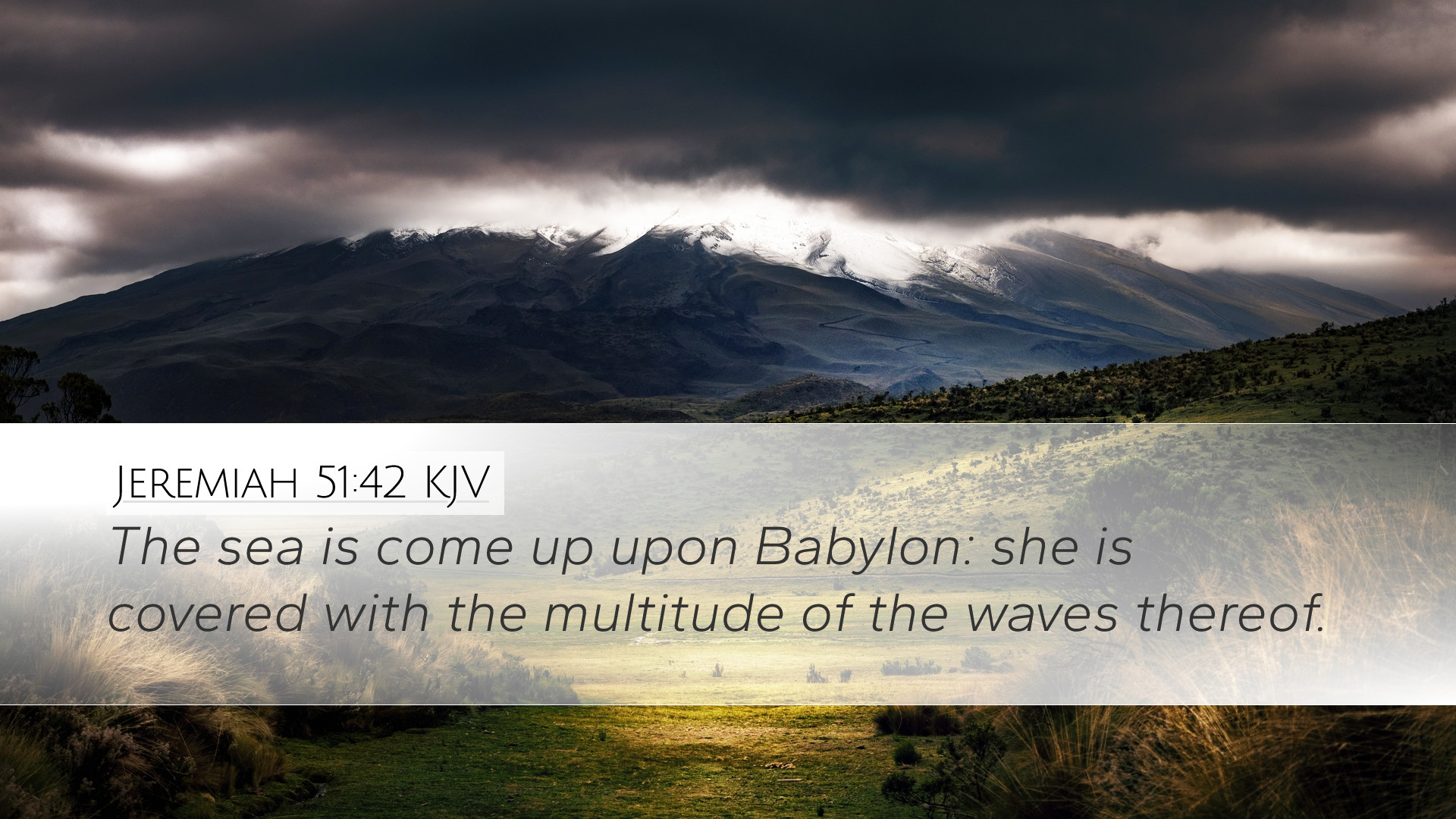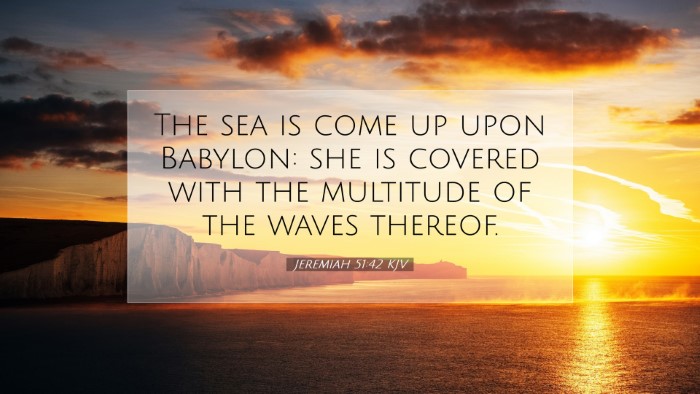Commentary on Jeremiah 51:42
Jeremiah 51:42 states, "The sea is come up upon Babylon: she is covered with the multitude of the waves thereof." This verse depicts the impending judgment upon Babylon, a theme prevalent throughout the Book of Jeremiah. Below, we will explore insights from various public domain commentaries that elucidate the meaning and implications of this verse.
Contextual Overview
At the time of this prophecy, Babylon represented the pinnacle of human pride and rebellion against God. The fall of Babylon is a significant focus of Jeremiah's prophetic messages. The imagery of the sea and its waves symbolizes overwhelming destruction, reflecting both physical and spiritual calamity.
Insights from Matthew Henry
Matthew Henry emphasizes the symbolic nature of the sea in this passage. He interprets the "sea" as a metaphor for the great and powerful forces that bring about Babylon's ruin. It signifies divine judgment coming upon the city, much like the waves of the sea engulfing land. Babylon, once a dominant power, will be brought low, engulfed by her own pride and wickedness.
- Divine Retribution: Henry notes that this devastation illustrates God's judgment against nations that oppose Him. Just as the waves hide a landscape, so too will the judgment erase Babylon's glory.
- False Security: The analogy serves to remind the world of the transitory nature of earthly power. Babylon's confidence in its strength will ultimately lead to its downfall.
Insights from Albert Barnes
Albert Barnes offers a more detailed analysis of the verse. He explains that the phrase "the sea is come up upon Babylon" signifies a flood of armies and nations converging against the city, representing a divine strategy to dismantle its pride.
- Historical Context: Barnes points out that Babylon's defeat came through a coalition of nations, which God orchestrated as punishment for their idolatry and oppression. This aligns with the larger prophetic narrative where God uses secondary agents to fulfill His will.
- Symbolism of Water: The waves are a common biblical symbol of chaos and judgment. Barnes reflects on how God controls these ‘waters,’ demonstrating His sovereignty over nations.
Insights from Adam Clarke
Adam Clarke provides a rich historical commentary relating to this verse. He reflects on the nature and extent of Babylon's punishment, acknowledging the literal and metaphorical drowning of this once-prosperous city.
- Prophetic Fulfillment: Clarke underlines the prophetic fulfillment of this verse, seen in historical accounts of Babylon's fall, which corroborate Jeremiah's warnings. The eventual siege and capture by the Medes and Persians serve as a testament to God's truth.
- Spiritual Implications: Beyond the physical destruction, Clarke invites scholars to consider the spiritual implications of this text. It serves as a warning for contemporary nations and churches about the perils of forsaking God’s commandments.
Theological Reflections
This verse presents a profound theological statement about God's character as a righteous judge. Throughout scripture, waters often symbolize chaos, judgment, and divine response to human sinfulness.
- God's Sovereignty: The imagery reinforces God's sovereign control over history. Just as he used Babylon as an instrument of judgment against Israel, so too will He raise nations to bring down the prideful.
- Call to Humility: For pastors and theologians, this verse serves as a stark reminder of the necessity for humility before God. Nations that exalt themselves will ultimately face a reckoning.
- Hope in Judgment: While the destruction of Babylon represents judgment, it also symbolizes hope for God's people. The fall of their oppressors heralds the vindication and restoration of God’s righteousness among His faithful.
Conclusion
Jeremiah 51:42 encapsulates key themes of divine judgment, sovereignty, and the transient nature of worldly power. The insights gathered from Matthew Henry, Albert Barnes, and Adam Clarke highlight the importance of this verse in understanding God's dealing with nations and His unwavering commitment to justice. For pastors, students, and scholars, this verse serves as both a warning and a reminder of God's ultimate authority over all creation.


